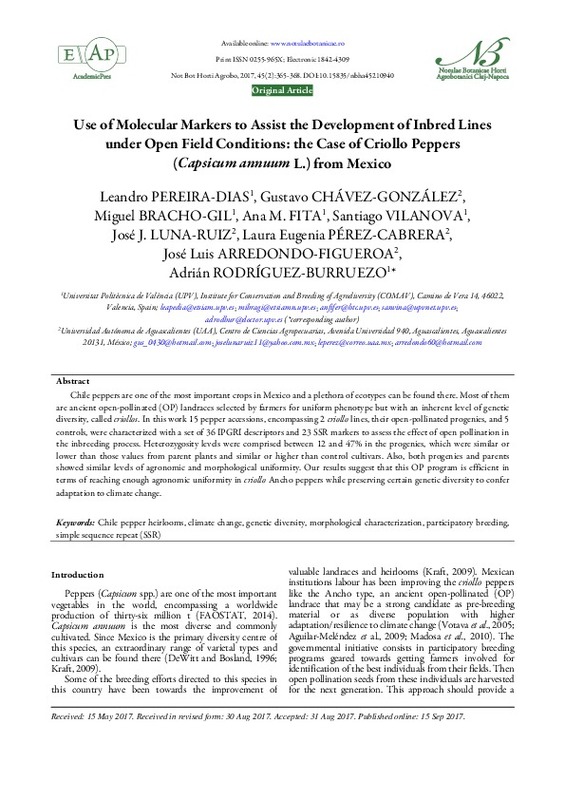JavaScript is disabled for your browser. Some features of this site may not work without it.
Buscar en RiuNet
Listar
Mi cuenta
Estadísticas
Ayuda RiuNet
Admin. UPV
Use of Molecular Markers to Assist the Development of Inbred Lines under Open Field Conditions: the Case of Criollo Peppers (Capsicum annuum L.) from Mexico
Mostrar el registro sencillo del ítem
Ficheros en el ítem
| dc.contributor.author | Pereira-Días, Leandro
|
es_ES |
| dc.contributor.author | Chavez-Gonzalez, G
|
es_ES |
| dc.contributor.author | Bracho Gil, M.
|
es_ES |
| dc.contributor.author | Fita, Ana
|
es_ES |
| dc.contributor.author | Vilanova Navarro, Santiago
|
es_ES |
| dc.contributor.author | Luna-Ruiz, JJ
|
es_ES |
| dc.contributor.author | Perez-Cabrera, L.E.
|
es_ES |
| dc.contributor.author | Arredondo-Figeroa, J.L.
|
es_ES |
| dc.contributor.author | Rodríguez Burruezo, Adrián
|
es_ES |
| dc.date.accessioned | 2018-05-24T04:25:33Z | |
| dc.date.available | 2018-05-24T04:25:33Z | |
| dc.date.issued | 2017 | es_ES |
| dc.identifier.issn | 0255-965X | es_ES |
| dc.identifier.uri | http://hdl.handle.net/10251/102505 | |
| dc.description.abstract | [EN] Chile peppers are one of the most important crops in Mexico and a plethora of ecotypes can be found there. Most of them are ancient open-pollinated (OP) landraces selected by farmers for uniform phenotype but with an inherent level of genetic diversity, called criollos. In this work 15 pepper accessions, encompassing 2 criollo lines, their open-pollinated progenies, and 5 controls, were characterized with a set of 36 IPGRI descriptors and 23 SSR markers to assess the effect of open pollination in the inbreeding process. Heterozygosity levels were comprised between 12 and 47% in the progenies, which were similar or lower than those values from parent plants and similar or higher than control cultivars. Also, both progenies and parents showed similar levels of agronomic and morphological uniformity. Our results suggest that this OP program is efficient in terms of reaching enough agronomic uniformity in criollo Ancho peppers while preserving certain genetic diversity to confer adaptation to climate change. | es_ES |
| dc.description.sponsorship | This work was partly financed by projects INIA RTA2013-00022-C02-02 and RTA2014-00041-C02-02, funded by Instituto Nacional Investigaciones Agrarias (Spain), FEDER funds. Also, Mexican authors thank CONACYT for financing the stay of Gustavo Chavez-Gonzalez in Spain, as well as the Programa Integral de Fortalecimiento Institucional (PIFI) de la UA de Aguascalientes (SEP-Mexico). | es_ES |
| dc.language | Inglés | es_ES |
| dc.publisher | AcademicPres (EAP) Publishing House | es_ES |
| dc.relation.ispartof | Notulae Botanicae Horti Agrobotanici Cluj-Napoca | es_ES |
| dc.rights | Reconocimiento (by) | es_ES |
| dc.subject | Chile pepper heirlooms | es_ES |
| dc.subject | Climate change | es_ES |
| dc.subject | Genetic diversity | es_ES |
| dc.subject | Morphological characterization | es_ES |
| dc.subject | Participatory breeding | es_ES |
| dc.subject | Simple sequence repeat (SSR) | es_ES |
| dc.subject.classification | GENETICA | es_ES |
| dc.title | Use of Molecular Markers to Assist the Development of Inbred Lines under Open Field Conditions: the Case of Criollo Peppers (Capsicum annuum L.) from Mexico | es_ES |
| dc.type | Artículo | es_ES |
| dc.identifier.doi | 10.15835/nbha45210940 | es_ES |
| dc.relation.projectID | info:eu-repo/grantAgreement/MINECO//RTA2013-00022-C02-02/ES/Obtención de patrones de pimiento tolerantes a bajos insumos de fósforo y genética de la adaptación radicular a estreses abióticos/ | es_ES |
| dc.relation.projectID | info:eu-repo/grantAgreement/MINECO//RTA2014-00041-C02-02/ES/Selección y mejora de variedades tradicionales de pimiento (Capsicum annuum L.) para rendimiento y calidad de fruto y adaptadas a cultivo ecológico/ | es_ES |
| dc.rights.accessRights | Abierto | es_ES |
| dc.contributor.affiliation | Universitat Politècnica de València. Departamento de Biotecnología - Departament de Biotecnologia | es_ES |
| dc.contributor.affiliation | Universitat Politècnica de València. Instituto Universitario de Conservación y Mejora de la Agrodiversidad Valenciana - Institut Universitari de Conservació i Millora de l'Agrodiversitat Valenciana | es_ES |
| dc.description.bibliographicCitation | Pereira-Días, L.; Chavez-Gonzalez, G.; Bracho Gil, M.; Fita, A.; Vilanova Navarro, S.; Luna-Ruiz, J.; Perez-Cabrera, L.... (2017). Use of Molecular Markers to Assist the Development of Inbred Lines under Open Field Conditions: the Case of Criollo Peppers (Capsicum annuum L.) from Mexico. Notulae Botanicae Horti Agrobotanici Cluj-Napoca. 45(2):365-368. https://doi.org/10.15835/nbha45210940 | es_ES |
| dc.description.accrualMethod | S | es_ES |
| dc.relation.publisherversion | http://doi.org/10.15835/nbha45210940 | es_ES |
| dc.description.upvformatpinicio | 365 | es_ES |
| dc.description.upvformatpfin | 368 | es_ES |
| dc.type.version | info:eu-repo/semantics/publishedVersion | es_ES |
| dc.description.volume | 45 | es_ES |
| dc.description.issue | 2 | es_ES |
| dc.relation.pasarela | S\350821 | es_ES |
| dc.contributor.funder | Instituto Nacional de Investigación y Tecnología Agraria y Alimentaria | es_ES |








